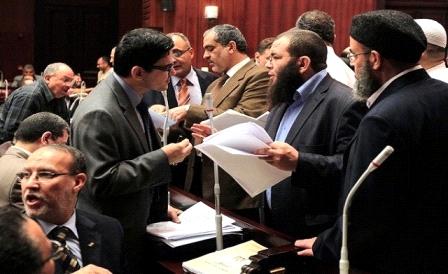Ammon News - By Al Arabiya With Agencies
While Islamists claim that President Mohammed Mursi has won initial backing from Egyptians for a new constitution, rights groups and opposition parties reported abuses such as polling stations opening late, officials telling people how to vote, and bribery.
A first day of voting in a referendum on the draft basic law resulted in 56.5 percent ‘Yes’ vote, Mursi’s political party said. An opposition official conceded that Egyptians voting on Saturday appeared to have backed the measure.
But Egypt’s opposition National Salvation Front coalition called nationwide demonstrations for Tuesday as it seeks to galvanize opposition to the controversial draft constitution before a second round of voting next weekend.
“The Front is calling on Egyptians to take to the streets on Tuesday to defend their freedoms, prevent fraud and reject the draft constitution,” a statement issued late on Sunday said.
According to analysts, next Saturday’s second set of balloting is likely to give another “yes” vote as the voting then will be in districts generally seen as even more sympathetic towards Islamists, and that would mean the constitution should be approved.
But the apparent closeness of the early tally gives Mursi only limited comfort as it exposes deep divisions in a country where he needs to build a consensus for tough economic reforms, explain Reuters analysts.
“The referendum was 56.5 percent for the ‘yes’ vote,” said a senior official in the operations room set up by the Brotherhood’s Freedom and Justice Party to monitor voting.
If the constitution passes, national elections can take place early next year, something that many hope will usher in the stability that Egypt has lacked since the fall of Hosni Mubarak nearly two years ago.
Rights groups criticized widespread religious campaigning that portrayed “No” voters as heretics.
A joint statement by seven human rights groups urged the referendum’s organizers “to avoid these mistakes in the second stage of the referendum and to restage the first phase.”
The electoral commission, “in the interest of national consensus”, must “recognize that it was not capable (of ensuring) good organization and it must redo the referendum,” said Negad el-Borei, a spokesman for one of the groups, which represents lawyers.
The opposition National Salvation Front coalition said it would “not recognize any unofficial result,” and would wait for the formal tally after next Saturday’s second round of voting.
It called on Egyptians to “take to the streets on Tuesday to defend their freedoms, prevent fraud and reject the draft constitution.”
It reiterated its allegation that balloting had been “marred by irregularities and violations”.
The head of the Front, Mohamed ElBaradei, a former chief of the U.N. nuclear energy agency, tweeted of the first round: “Country split, flagrant irregularities, low turnout, disillusion w(ith) Islamists on the rise. Illiteracy remains a hurdle.”
Violence
Violence between the charter’s supporters and opponents flared in Egypt’s two largest cities, Cairo and Alexandria, just before and after the referendum, with police repelling an Islamist attack on the liberal Wafd party headquarters in the capital on Saturday night.
On December 5, clashes between pro- and anti-Mursi demonstrators outside the presidential palace killed eight people injured hundreds, prompting the army to deploy troops and tanks around the compound.
If the constitution is approved, Mursi hopes it will end a tumultuous transition almost two years after a popular uprising overthrew president Hosni Mubarak and ushered in interim military rule before Mursi’s election in June.
Liberals and Christians had boycotted the assembly that drafted the charter, complaining the Islamist-dominated panel had ignored their concerns.
The Brotherhood and its Freedom and Justice Party threw its formidable organizational machine behind a “yes” campaign for the draft constitution.
But many opposition voters were especially hostile towards the Brotherhood, which the National Salvation Front believes wants to usher in strict Islamic laws.
International watchdogs, the U.N. human rights chief, the United States and the European Union have all expressed reservations about the draft because of loopholes that could be used to weaken human rights.
